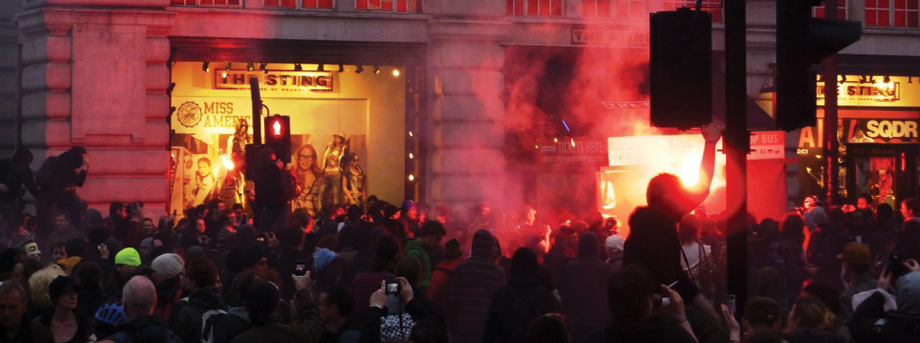Worrying legacy of Britain’s riots
October 19th, 2011
The real damage of the riots that gripped Britain earlier this year has not yet been properly considered, say University of Nottingham experts.
Despite debates on the causes of the riots, there has been little talk of their legacy. A new study — led by Drs Matthew Goodwin, Mark Pickup and Eline de Rooij — shows an increase in the number of Britons that feel their security and their wider society and culture is threatened.
“The study uncovered many significant areas of concern,” said Dr Goodwin. “Chief among them is that those who felt after the riots that their security was under greater threat, were more likely to express hostile attitudes toward Muslims.
“Those who felt afterwards that wider British society and culture were under greater threat were more likely to express hostility toward Muslims and also black and East European communities. So, while the riots were not associated in the public mindset with particular minority groups, they have nonetheless potentially increased prejudice in British society. This is a troublesome effect.”
The study — funded by the University’s Integrating Global Society group (a research priority area) — is the first systematic investigation of how the riots have influenced public attitudes.
Dr Pickup said: “We put a survey into the field two weeks before the riots. The events around the country have given us the chance to see how attitudes have changed”
The perception of threat is an important aspect. As the study demonstrates, the feeling of threat feeds prejudice towards other groups.
Dr Goodwin added: “Feelings of ‘threat’ are especially important, as they have been shown to have powerful effects on public attitudes toward issues such as immigration and diversity, and also on voting behaviour.
“If people feel more threatened then they are more likely to express prejudice toward other groups, favour more restrictive policies on issues such as immigration, and support extremist parties.”
The study’s broad findings show public perceptions of individual economic threat did not increase after the riots, and neither did collective economic threat.
Rather, people were more likely to feel that their safety was threatened; they were more fearful of increasing violence and vandalism in their neighbourhood. They were also more likely to feel that wider British culture and society was under threat.
Feelings of security threat increased by ten per cent and feelings of cultural threat increased by five per cent. These were ‘statistically significant’ effects.
“It is rare that we are able to observe and measure the effects of a significant real-world event, such as the riots,” says Dr Pickup. “But the findings …reveal how threats to security and culture, whatever the source, reduce tolerance in our society.”
The study is based on the Academic Omnibus Project run by YouGov and draws on two (online) surveys of a nationally representative sample of 1,000 citizens in the first survey (11-18 July) and 2,000 citizens in the second (17-18 August). The surveys included a battery of questions about individuals’ social and economic profile, their attitudes toward minority groups and voting intention. These questions allowed them to probe the extent to which citizens feel threatened, and prejudiced toward minority groups.
The study was led by Dr Mark Pickup and Dr Matthew Goodwin from the School of Politics and International Relations at The University of Nottingham, and Dr Eline de Rooij from Nuffield College at the University of Oxford. It was funded by the Integrating Global Society group at The University of Nottingham, with generous logistical assistance from YouGov-Cambridge.
Tags: Academic Omnibus Project, Dr Eline de Rooij, Dr Mark Pickup, Dr Matthew Goodwin, Integrating Global Society, School of Politics and International Relations, YouGov-Cambridge
Comments are closed.
Other Research

Welcome to Associate Pro-Vice-Chancellor for Researcher Academy and Research Culture Development
Professor Jeanette Woolard has been appointed as Associate Pro-Vice-Chancellor for the Researcher Academy and Research Culture Development. […]

Strong research funding performance is a fantastic achievement
Professor Tom Rodden’s research update I am delighted to report that the University of Nottingham is […]


